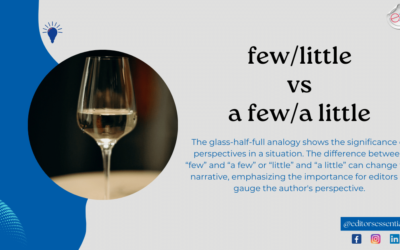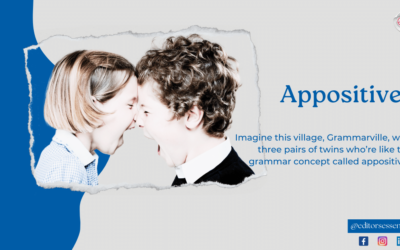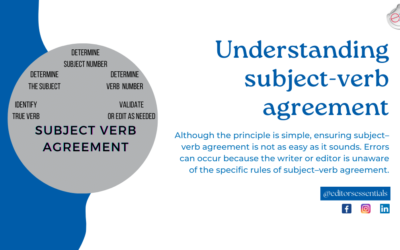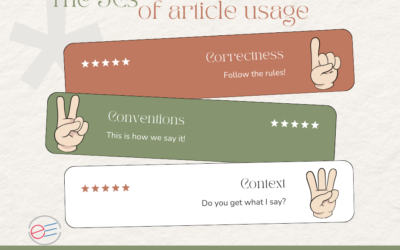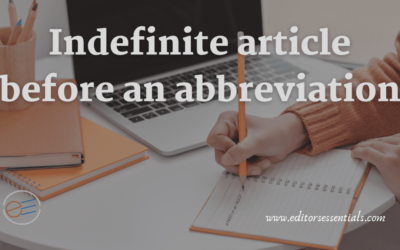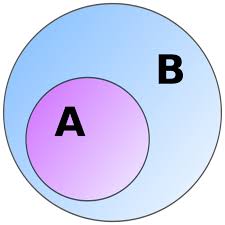The glass-half-full analogy shows the significance of perspectives in a situation. The difference between “few” and “a few” or “little” and “a little” can change a narrative, emphasizing the importance for editors to gauge the author’s perspective.
Appositives, the twins of Grammarville
Imagine this village, Grammarville, with three pairs of twins who’re like the grammar concept called appositives: the Siamese twins – super attached, just like how necessary appositives are for a sentence’s meaning; non-identical twins – not-so-tied, giving extra details like non-restrictive appositives; and mischievous identical twins ¬– context, like knowing which twin’s who, decides their use. Identifying twins needs attention – so is the case for editors!
Understanding subject–verb agreement
The principle behind subject–verb agreement is simple. But ensuring subject–verb agreement is not as easy as it sounds. Errors in agreement can occur because the writer or editor is unaware of the specific rules of subject–verb agreement. Even for those who know the rule, mistakes can happen due to typos, oversight, or rushing through the editing process.
Mastering article usage in English
To approach this linguistic challenge with clarity and precision, we break down the learning process into three distinct categories: correctness, conventions, and context. These three dimensions provide unique insights into the rules that govern articles, the idiomatic expressions that shape their usage, and the dynamic contextual cues that guide their application. By understanding the different layers of article usage, one can systematically approach the learning of article usage.
Which indefinite article goes before an abbreviation?
Seemingly simple decisions such as which indefinite article will go before a word can quickly turn into a difficult choice. While editors and most authors have mastered this decision-making, sometimes even experienced editors may stumble into a problem when an abbreviation is encountered.
What’s wrong? Correcting a wrong modifier
Whether you are a writer or an editor, when you add phrases, always ensure that they modify the appropriate part of the sentence.
Did you know these are editing myths?
Rules might change, myths might vanish, and only the minds which are open to learning will survive.
misplaced nodifier
A WhatsApp conversation. U: "What is the English translation of பà¯à®°à¯à®à¯à®à®¾à®² à® à®à®¿à®ªà¯à®ªà®à¯?" S: "War footing" U: "Thanks, S. Is this a noun?" S: "Welcome" U: "Adjective?" S: "Yes" "On a war footing" "Adverb" "Action taken on a war footing"...
More thoughts on since vs. because. Or, Since you read my previous post…
In my previous post I talked about the use of since and because and how they are different or same. This piece is more a hangover due to the previous post. After having thought and talked about the grammar side of since vs. because, I still felt the previous...
Since when since has been replaced by because? Or, to sin(ce) or not to sin(ce)?
The moment you started typing since, Google will suggest since vs because. Such is the power of this pair of words. The confusion stems from the fact that since and because are interchangeable, though not always. In fact, there is no confusion most of the times....
An approach to “approach to”
Not necessarily is “to” always an infinitive marker; it can be a preposition too.
Mr Venn, tell me more
The last post explained how restrictive (or defining) relative clauses create a proper subset of a set. In other words, these clauses classify the noun into two: one that is governed by the relative clause definition; the other that is not. But an important...
Mr Venn, what are relative clauses?
All right, now I got your question – rather, questions. Who's Mr Venn? Why would he come to teach English? What is he teaching now? Before you inundate me with all those questions, let me tell you about him. John Venn, FRS, FSA (4 August 1834 – 4 April 1923) was...
Try this exercise on “however” and “though”
One of my blog posts that bring in several new visitors is "however vs. though". So I thought I should share some example sentences with you all. You may try to find out whether the sentences are correct and punctuate accordingly. More precisely, use "however", not...
Adjectives: Beware of suffixes -ical and -ic
One of the ways to form an adjective is to add the suffix ~ic or ~ical. There is no clear rule about when to use which. As a rule of thumb, many of the older nouns have the ~ical adjective, while most of the newer ones have ~ic suffix. The suffix ~ic or ~ical means...
Is this good?
Teacher: Children, what do you observe from the picture? Students: Two kids, Teacher. One with a gadget, one with a bird. Teacher: Good. What do you see below? Student: As is the custom in FB, any picture that is shared should accompany a moral. This picture is also...
Obsequies and Obsequious
John McIntyre, the night content production manager at Baltimore Sun, presents In a Word, a word of the week column in his blog You Don't Say, Every week McIntyre chooses from a range of endangered words and discusses it, so as to breathe new life into these words....
Today’s crash blossoms
Today's crash blossoms is from The Hindu.TV shows jailed IPS officer visiting homeYou might be tempted to believe that an IPS officer was jailed by a TV show. Our mind parses "TV shows" together as the subject of the sentence and the verb as "jailed". This is because...
“Such as” parenthetical phrases
Commas are most probably the tiniest creature that can cause heartbreaks to any copy editor. The simple reason is that they are not solely governed by rules. Arguably, using commas have as many exceptions as there are rules. Consider such as for example. The such as...
Humorous CMS
After a hiatus, this post could be a good one to resume blogging. I was reading the Chicago Style Q&A and liked two questions in this issue. The first one: Q. Should she or it be used as a pronoun for a country? A. Never use she to refer to a country. You’ll sound...
however vs. though
I just tried to clarify the usage of "however" and "though".
each of them vs they each
Here is another trivia. The indefinite pronoun "each" is singular. It takes a singular verb. Each creation is different. Note that "each" comes before a singular noun and takes a singular verb. If "each" is followed by an "of" phrase, still it takes a singular verb....
well, is that good?
In a recent interview aired on channel Star Vijay, Gopinath interviewed a Tamil actor. The actor was recalling how he felt it difficult to perform certain dance movements. When Gopinath asked the actor how one of his co-actors dances, he said, "He is a good dancer;...
(faulty) parallelism
As part of rebuilding this blog (I started this blog way back in 2008, with nothing being posted till now), I was skimming through various WordPress pages. In the About page, I saw this sentence: It also means you are free to use it [WordPress] for anything from your...

